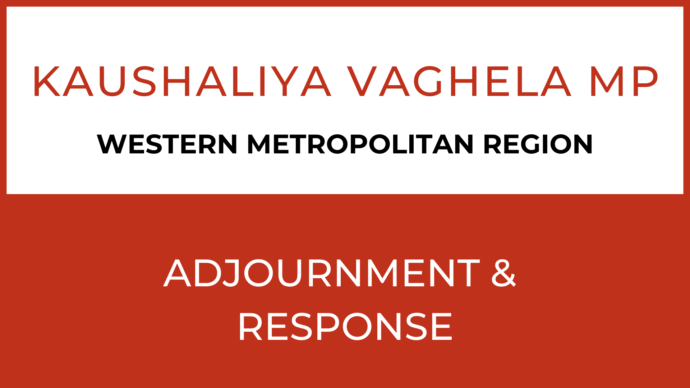Ms VAGHELA (Western Metropolitan):
My adjournment matter is directed to the Honourable Lily D’Ambrosio, MP, the Minister for Energy, Environment and Climate Change and Minister for Solar Homes. My adjournment matter relates to the minister’s portfolio responsibilities for energy, environment and climate change.
Minister, the Andrews Labor government is leading the way in reforming Victoria’s waste and recycling industry to pave the way for a more eco-friendly and sustainable future. Seventeen local councils will share more than $1 million in grants to deliver education and behavioural change campaigns ahead of the transition to a four-bin recycling service.
Victorians will soon be sorting their household waste and recycling into four bins—with a separate bin for glass recycling and food and garden organics. This forms part of our state’s circular economy policy, with the aim of diverting 80 per cent of waste from landfill by 2030. All local government areas will transition to a new glass service by 2027 and a new food and garden organics service by 2030. Some local governments, like Hobsons Bay City Council and Macedon Ranges Shire Council, are leading the way in the rollout, having already introduced new kerbside bins.
This support will assist councils to provide the tools for Victorians to understand what is changing and how they can contribute to our state’s circular economy. This investment coincides with the over $515 million invested into the Andrews Labor government’s significant reform of the waste and recycling industry. This includes $380 million to deliver Recycling Victoria, which works towards reducing waste, boosting jobs and creating a circular economy.
The action I seek from the minister is to please advise me how constituents in my electorate of Western Metropolitan Region will be made aware of this important initiative.
Reply:
Lily D’Ambrosio MP Minister for Energy, Environment and Climate Change Minister for Solar Homes (01 November 2021):
Recycling Victoria: A new economy is the Victorian Government’s circular economy policy and action plan. Delivery of this policy is part of the government’s $515 million investment to transform our waste and recycling sector to deliver a recycling system Victorians can rely on. More than that, it will drive fundamental change in our economy to reduce waste and make more productive use of our resources.
Through Recycling Victoria we are changing how Victorians recycle and standardising waste and recycling services to reduce public confusion, ensuring materials collected from households are high quality and can be used again to make new products. This includes collecting glass separately to ensure more of it is effectively recycled and improves the recovery of other materials in the mixed recycling bin by removing broken glass, which is a major contaminant. Standardising food organics and garden organics across the state will also significantly reduce the amount of waste going to landfill and greenhouse gas emissions. This service reform is accompanied by standardised bin lid colours and standardised bin contents, which means all Victorians will know what can and cannot be put into a bin regardless of where they are in the state.
To ensure the best outcomes of the policy, Recycling Victoria is also delivering a statewide education and behaviour change program to help households better understand their new recycling system. This includes a suite of campaign materials for use by councils as they transition their services, including best-practice guidance and collateral for delivering campaigns. Each council will implement campaign materials locally as they introduce their new kerbside collection services.
The Recycling Victoria Household Education and Behaviour Change Fund will award grants to councils and Alpine Resort Management Boards, to support them in communicating changes to their recycling system. Households will be hearing from their councils about their new kerbside services at different times depending on the timing of the introduction of new services. Councils will be required to provide a service to separate glass by 2027, and food organics and garden organics by 2030. Councils supported through round one of the fund include two from the Western Metropolitan region – Melton and Hobsons Bay. The remaining councils will be applying for funding in the lead up to introducing their new services.
Councils will also receive financial support to introduce new bins and services and communities will be engaged by councils to have their say on how these new services are implemented, taking into consideration the different needs of communities.
